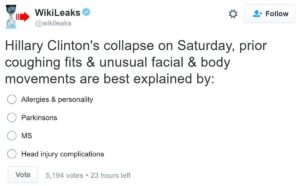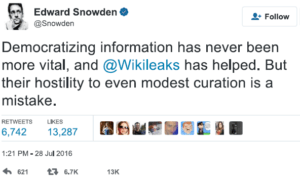WikiLeaks: The Democratization & Commoditization of Secretive Information

A platform built on the power (and fear) of information
“We were young, we were foolish, we were arrogant, but we were right” – Daniel Ellsburg
Ellsburg
On April 5, 2010, WikiLeaks released a classified US military video depicting the killing of over one dozen people by an Apache helicopter in the Iraqi suburb of New Baghdad, including two people on the Reuters news staff. After the release of the video, Reuters attempted, unsuccessfully, to obtain the video through the Freedom of Information Act, and the US military remained silent on how the two Reuters staff members were killed. The videos shocked the global community and served as fuel for those in the US and abroad who were opposed to the US invasion of Iraq and perceived American imperialism in the Middle East.
How is it that WikiLeaks, a small, dispersed online community of political-activists with limited funding and resources, was able to obtain this highly damaging video, while a massive international news organization such as Reuters was unable to do so, even after the video leaked? The answer: by creating a powerful platform consisting of whistle-blowers and international news outlets, WikiLeaks has democratized and commoditized global governments’ sensitive and secretive information.
Information warfare
Founded in 2006 by Australian hacker turned political-activist Julian Assange, WikiLeaks touts itself as a multi-national media organization that specializes in the analysis and publication of censored and restricted official materials involving war, spying, and corruption [1]. Operating with a staff of over one hundred people globally, WikiLeaks has published more than 10 million documents and related analyses [2].
“WikiLeaks is a giant library of the world’s most persecuted documents. We give asylum to these documents, we analyze them, we promote them and we obtain more.” – Julian Assange
Since its inception, WikiLeaks has played a crucial role as a platform connecting international media outlets with whistle-blowers and leakers afraid of prosecution. WikiLeaks success and ability to scale over the years has stemmed from two primary factors related to its ability to create and capture value: i) perceived independence and credibility, ii) strong relationships with collaborators, on both sides of its platform.
WikiLeaks quickly grew to prominence as a result of its ability to accept and display leaked information without exposing sources’ identities or caving to government pressure to censors its input [3]. According to Alex Howard, a senior analyst at the Sunlight Foundation, an advocacy group pushing for government transparency: “it was hugely significant, the technical capacity to enable whistle-blowing, and then to keep the documents in question online through distributed networks and mirroring” [4].
WikiLeaks worked closely with global media partners to confirm the veracity of submitted leaks, as well as to redact potentially sensitive personal information prior to their release. Glenn Greenwald, a journalist for The Guardian well-known for his role in the Edward Snowden NSA scandal, confirmed that WikiLeaks worked closely with partners to redact information when releasing Pentagon documents about the Afghanistan and Iraq wars, even writing “a letter to the State Department before [releasing] the cables requesting the State Department’s help in figuring out which information ought to be withheld” [5].
WikiLeaks perceived journalistic integrity and desire to work with, and protect, partners on each side of its platform, allowed it to grow rapidly and garner significant recognition via numerous journalistic awards, becoming the central conduit for whistle-blowers to disseminate information to the global community.
| Award Name | Year |
| The Economist New Media Award | 2008 |
| The Amnesty New Media Award | 2009 |
| TIME Magazine Person of the Year, People’s Choice | 2010 |
| The Sam Adams Award for Integrity | 2010 |
| The National Union of Journalists Journalist of the Year (Hrafnsson) | 2011 |
| The Sydney Peace Foundation Gold Medal | 2011 |
| The Martha Gellhorn Prize for Journalism | 2011 |
| The Blanquerna Award for Best Communicator | 2011 |
| The Walkley Award for Most Outstanding Contribution to Journalism | 2011 |
| The Voltaire Award for Free Speech | 2011 |
| The International Piero Passetti Journalism Prize of the National Union of Italian Journalists | 2011 |
| The Jose Couso Press Freedom Award | 2011 |
| The Privacy International Hero of Privacy | 2012 |
| The Global Exchange Human Rights People’s Choice Award | 2013 |
| The Yoko Ono Lennon Courage Award for the Arts | 2013 |
| The Brazillian Press Association Human Rights Award | 2013 |
| The Kazakstan Union of Journalists Top Prize | 2014 |
[6]
Weaponization
In recent years, however, WikiLeaks has come under significant scrutiny from even its staunchest allies, as many of the factors that enabled it to scale, namely the platform and its operators’ credibility, have come into question.
The most recent US presidential election serves as an important window into people’s concerns that WikiLeaks has transitioned from a model of information distribution to weaponization in order to serve its own political purposes. During the election, many observers believe that WikiLeaks played favorites when releasing sensitive and potentially embarrassing information (e.g. Democractic National Committee email hack). More importantly, many believe that WikiLeaks was politically motivated, and may have even been working with Russian intelligence to directly influence the outcome of the election [7]. During points of the campaign, the WikiLeaks Twitter account sometimes looked more like an opposition research firm working to undermine Hillary Clinton than a platform to provide updates from non-partisan whistle-blowers [8].
[9]
Further, many organizations that were formerly collaborators and supporters of WikiLeaks have begun to distance themselves as a result of its recent insistence not to redact potentially sensitive information from its postings. Even Edward Snowden, who exposed the NSA’s surveillance program, and who WikiLeaks helped escape to political asylum in Russia, has criticized WikiLeak’s insistence on releasing all information it receives in raw form [10].
[11]
Panama
In a world where success attracts attention from potential competitors, any perceived compromise in WikiLeak’s independence and credibility could be hugely damaging for its information gathering and distribution platform. The risk of new entrants is particularly magnified given the ability of whistle-blowers and media outlets to access the same central service that WikiLeaks provides from multiple platforms. Platform participants’ ability to multihome significantly reduces WikiLeak’s leverage over potential competitors should its users lose faith in its objectivity and independence.
Paul Rosenzweig, a cybersecurity consultant who worked in the Department of Homeland Security under George W. Bush, argues that this may already be taking place, as WikiLeak’s “radical transparency” loses appeal when people believe it has become a tool for governments to use against one another [12].
In fact, coverage of the biggest mass leak of the last year, the Panama Papers, was handled by the International Consortium of Investigative Journalists, without the involvement of WikiLeaks. The Consortium coordinated with over 100 media organizations to analyze the documents and avoided releasing personal information when it distributed its findings. Going forward, there is a very real risk that WikiLeaks sees the power of its platform erode as whistle-blowers prefer to work with organizations that are not seen as politically motivated or irresponsible leakers of personal data [13].
“If you’re the next Snowden, do you go there, or do you go to a media organization that has a different approach, that has the capacity and ethical standards that says potential harms are addressed” – Alex Howard
References:
[1] “What is WikiLeaks.” WikiLeaks. November 3, 2015. https://wikileaks.org/What-is-Wikileaks.html.
[2] “What is WikiLeaks.” WikiLeaks. November 3, 2015. https://wikileaks.org/What-is-Wikileaks.html.
[3] Brustein, Jousha. “Why Wikileaks is Losing its Friends.” Bloomberg. July 29, 2016. https://www.bloomberg.com/news/articles/2016-07-29/why-wikileaks-is-losing-its-friends.
[4] Brustein, Jousha. “Why Wikileaks is Losing its Friends.” Bloomberg. July 29, 2016. https://www.bloomberg.com/news/articles/2016-07-29/why-wikileaks-is-losing-its-friends.
[5] Mackey, Robert. “What Julian Assange’s War on Hillary Clinton Says About WikiLeaks.” The Intercept. August 6, 2016. https://theintercept.com/2016/08/06/accusing-wikileaks-bias-beside-point/.
[6] “What is WikiLeaks.” WikiLeaks. November 3, 2015. https://wikileaks.org/What-is-Wikileaks.html.
[7] Brustein, Jousha. “Why Wikileaks is Losing its Friends.” Bloomberg. July 29, 2016. https://www.bloomberg.com/news/articles/2016-07-29/why-wikileaks-is-losing-its-friends.
[8] Mackey, Robert. “What Julian Assange’s War on Hillary Clinton Says About WikiLeaks.” The Intercept. August 6, 2016. https://theintercept.com/2016/08/06/accusing-wikileaks-bias-beside-point/.
[9] Twitter.
[10] Brustein, Jousha. “Why Wikileaks is Losing its Friends.” Bloomberg. July 29, 2016. https://www.bloomberg.com/news/articles/2016-07-29/why-wikileaks-is-losing-its-friends.
[11] Twitter.
[12] Brustein, Jousha. “Why Wikileaks is Losing its Friends.” Bloomberg. July 29, 2016. https://www.bloomberg.com/news/articles/2016-07-29/why-wikileaks-is-losing-its-friends.
[13] Brustein, Jousha. “Why Wikileaks is Losing its Friends.” Bloomberg. July 29, 2016. https://www.bloomberg.com/news/articles/2016-07-29/why-wikileaks-is-losing-its-friends.





Another thought-provoking topic and post. Two points about WikiLeaks as a platform jump out in particular: 1) its ability to protect the anonymity of its “content suppliers” and 2) its perceived lack if independence and the effect this has on its reputation. I can see how anonymity and independence are crucial for success in this context and now I’m wondering how generalizable that is across platforms. Protection may be especially important for whistleblowers (and objectivity for news sites), but it feels like these are important to others too and may belong on a longer list of responsibilities that platforms should take on.
Echoing the above, great post. Very interesting to think about a platform play where the ultimate goal of cornering the market is not to generate profit. In thinking about this through a traditional business lens, I am curious what your take would be on how big the “barriers to entry” are in this “business,” both in terms of ability to generate trust and the technical expertise to create a secure enough platform to run it. Governance is obviously an important part of any platform and per your discussion, WikiLeaks’ seems to have lapsed – are they powerful enough that it’s a non-issue, or are they walking a fine line?
Great read! It’s interesting to see an example of a platform where networking effects play (almost) no role–WikiLeaks, or any of its competitors in this space, don’t really need a large “user” base in order to succeed; the nature of their “product” will make it highly sought after by default.
When it comes to maintaining “barriers to entry” and “competitive advantages” to Will’s point above, they have a lot to worry about on the supply-side; it’s ever more critical for them to maintain their perception of trust, integrity, and technical expertise. Otherwise, the “suppliers” will go somewhere else with their leaks. These are extremely fragile competitive advantages, because once your reputation is tainted, it’s hard to recover. That said, with regard to the demand-side, even if their reputation is damaged and they’re widely perceived to be politically biased/manipulated, won’t people still read their stuff anyway?
Very interesting post! I would be very curious to learn more about who is funding them — Wikileaks must be pulling in a substantial amount of revenue to support a staff of over one hundred globally. Their site offers little transparency as to their donors’ identities / contributions, but I would think both would influence the site’s political agenda.